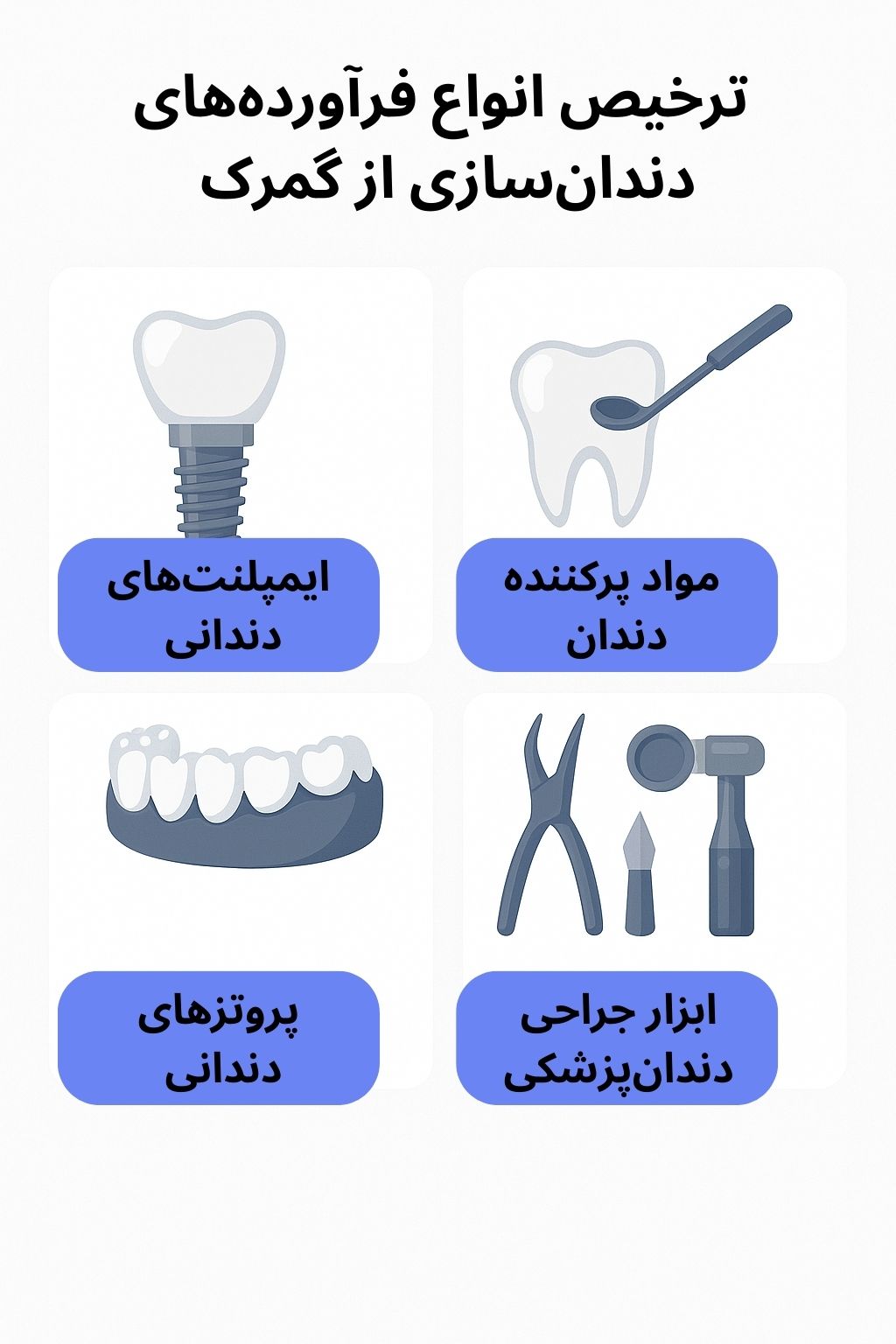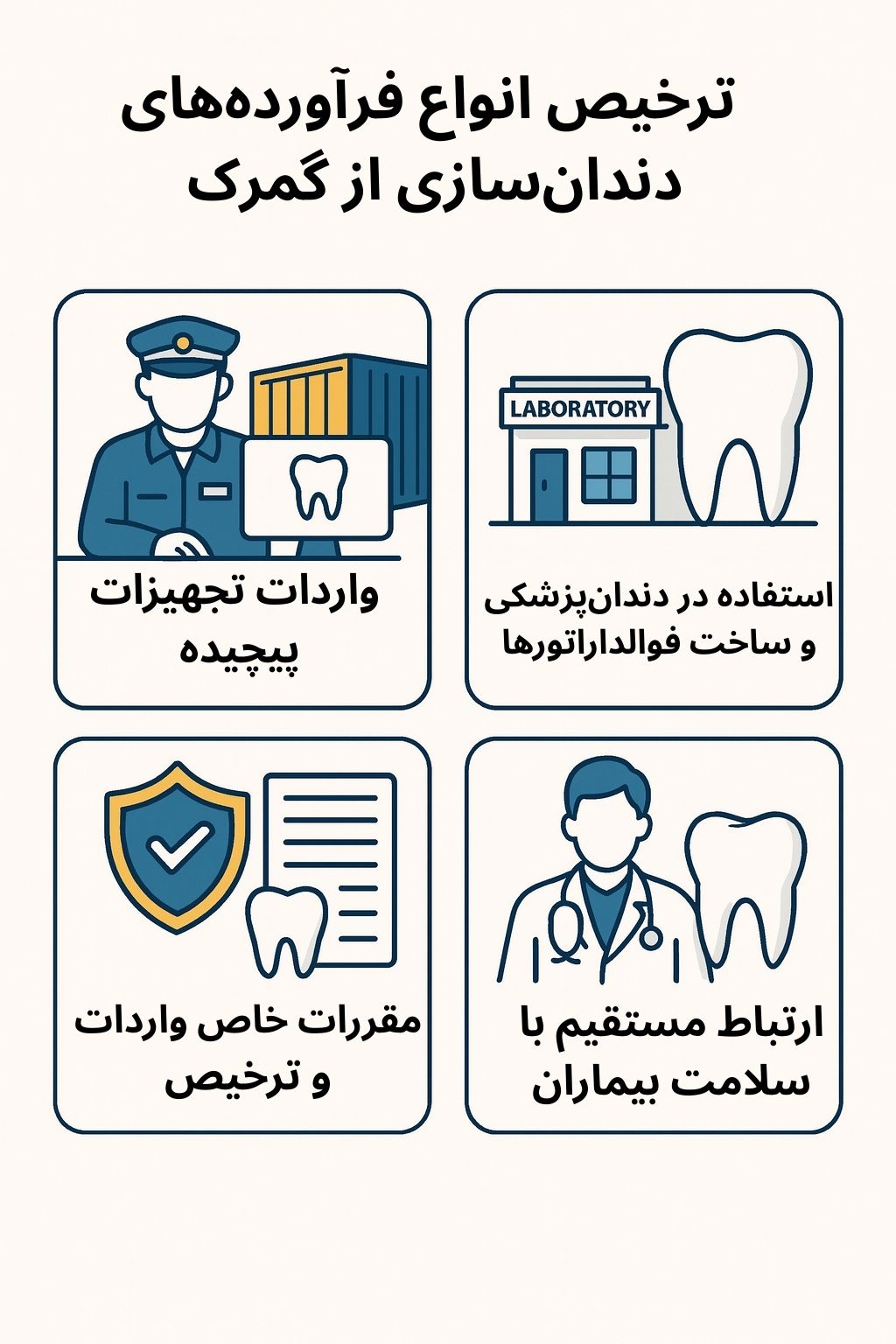Customs Clearance of Various Dental Products from Iran Customs (HS Code + Documents & Permits)
To estimate the time and cost of clearing dental products, contact the experts at Saba Tarkhis.
Instant free consultation
1) Types of Dental Products with Applications
1. Dental Implants
Dental implants are used as a permanent replacement for missing teeth. These products are usually made of titanium or biocompatible alloys that integrate well with body tissues. Implants play an important role in restoring the natural function and appearance of teeth.
Customs Tariff Code: 9021.10
2. Dental Filling Materials
These materials include composites, amalgam, and ceramics, and are used to restore and fill damaged teeth. Due to their high strength and ability to match natural tooth color, dental filling materials are among the most popular in dentistry.
Customs Tariff Code: 3006.40 (for cements and specific dental materials)
3. Dental Prostheses (Fixed & Removable)
Fixed and removable dental prostheses are used as replacements for missing teeth. Fixed prostheses are often installed on implants or natural teeth, while removable prostheses can be taken out of the mouth.
Customs Tariff Codes: 9021.21 (fixed prostheses) and 9021.29 (removable prostheses)
4. Dental Surgical Instruments
Dental surgical instruments include forceps, dental burs, scalpels, and other tools used for complex oral and maxillofacial surgeries. The quality and precision of these instruments play a key role in surgical success.
Customs Tariff Code: 9018.41
5. Dental Impression Materials
These materials are used to take precise impressions of teeth and jaws. Silicone, polyether, and alginate are among the materials used for dental impressions. Impression materials are vital for fabricating accurate, high-quality prostheses.
Customs Tariff Code: 3006.70
6. Dental Radiography Devices
These devices are used to image teeth and jaws for accurate diagnosis of dental problems. Digital and panoramic radiography are important devices in dental diagnosis and treatment.
Customs Tariff Code: 9022.13
7. Orthodontics & Accessories
Orthodontic supplies include brackets, wires, and retainers used to correct dental and jaw abnormalities. Orthodontics is one of the most commonly used methods in dentistry, with significant impact on improving appearance and function.
Customs Tariff Code: 9021.19
8. Dental Bleaching Materials
Bleaching materials are used to whiten teeth and improve their appearance. Due to their rapid and lasting effect, they are widely used in cosmetic dentistry.
Customs Tariff Code: 3306.10
9. Dental Surgical & Restorative Powders
These powders are used to repair surgical wounds and support jawbone regeneration. Restorative powders are crucial in dental surgeries and rebuilding lost tissues.
Customs Tariff Code: 3006.50
10. Dental Laser Devices
Laser devices are used for precise cutting and abrading of soft and hard tissues in dental surgeries. This advanced technology reduces pain and increases surgical accuracy.
Customs Tariff Code: 9018.59
11. Dental CAD/CAM Systems
These systems are used for digital design and production of dental prostheses. CAD/CAM systems provide high precision in prosthesis fabrication and enhance the quality of dental treatments.
Customs Tariff Code: 9023.00
12. Dental Amalgam
Amalgam is a composite material of mercury and metal alloys used to fill damaged teeth. Due to its durability and reasonable cost, it is still used in many dental clinics.
Customs Tariff Code: 3006.30
13. Dental Syringes & Injection Equipment
Dental syringes are used to inject medications and anesthetics during dental treatments. These syringes must meet high sanitary standards to be used in dentistry.
Customs Tariff Code: 9018.32
| Product Group | Sample Items | HS Code |
|---|---|---|
| Implant/Prosthesis/Orthodontics | Implant, fixed/removable prosthesis, bracket | 9021.10 / 9021.21 / 9021.29 / 9021.19 |
| Medical Instruments/Devices | Surgical tools, laser, radiography | 9018.41 / 9018.59 / 9022.13 |
| Consumables/Chemicals | Composite, amalgam, impression, restorative powder, bleaching | 3006.40 / 3006.30 / 3006.70 / 3006.50 / 3306.10 |
| Digital/Measurement Systems | CAD/CAM, measuring kits | 9023.00 |
| Injections & Consumables | Dental syringe and injection supplies | 9018.32 |
Final classification depends on material, medical grade, sterile/semi-sterile status, packaging, application, and certificates.
2) Key Steps & Notes in Clearing Dental Products
Obtaining sanitary permits: All dental products must obtain the necessary permits from the Iran Food and Drug Administration (IFDA). These permits indicate the product’s compliance with sanitary and safety standards.
Evaluation against international standards: All dental equipment and materials must comply with global standards such as European CE or U.S. FDA to receive import authorization.
Product authenticity: One of the most important issues in clearing dental products is verifying authenticity and ensuring quality. Counterfeit or low-quality goods are quickly seized at customs and their clearance may be delayed.
Packaging and transportation: Due to the high sensitivity of dental products, they require proper packaging and transportation under standard conditions. Goods must also be imported with valid insurance so that damages are compensated in case of incidents.
Customs valuation: Valuation of dental products is performed based on valid documents and invoices. These must be accompanied by technical documents and full descriptions to avoid issues during valuation and clearance.
Staying informed on legal changes: Regulations related to the import and clearance of medical equipment and dental products are constantly updated. Therefore, being aware of the latest legal changes and customs circulars is critical.
3) Exporting & Importing Countries of Dental Products
Germany: As a hub of medical equipment manufacturing, Germany accounts for a significant portion of dental product exports. Major German manufacturers such as Straumann and Dentsply Sirona have a large share of the implant and dental prosthetics market.
Switzerland: With advanced manufacturers of dental implants and surgical materials, Switzerland is a leading exporter of dental products. Swiss brands are globally recognized in dentistry.
Italy: Italy is also a key player in producing dental equipment, focusing on imaging devices, dental prostheses, and bleaching materials. Owing to competitive prices and high quality, Italian products attract global markets.
In addition to European countries, Japan and South Korea are prominent Asian exporters of dental products, especially in new technologies and digital dental devices such as CAD/CAM systems.
4) Importing Countries & Trade Volumes in Iran/Worldwide
Iran: In Iran, dental products are imported from countries such as Germany, Switzerland, South Korea, China, and Japan. Due to the high quality of their products and strong track record in medical equipment manufacturing, these countries supply the Iranian market. With the increase in the number of dentists and expansion of dental clinics, demand for importing these products into Iran is steadily growing.
North and South America: Large North American countries such as the United States and Canada are also major importers of dental equipment, although the U.S. itself is a major producer in this field. In South America, larger countries such as Brazil and Argentina are important markets for importing dental products.
In Iran, the annual import volume of dental products also reaches several million dollars. The largest imports include implants, filling materials, and dental imaging devices. These products are imported from European countries and East Asia, and due to the increasing number of dental clinics and growing demand for health services, this figure is continuously rising.
Top Exporters Worldwide
Globally, advanced European and Asian countries are recognized as the main exporters of dental products:
Germany
Switzerland
Italy
Japan
South Korea
These countries hold the largest share of dental product exports in global markets.
Top Importers Worldwide
The largest importers of dental products are countries with large economies and populations where the need for dental services is growing:
United States
China
Canada
India
Iran
These countries import high volumes of dental equipment and materials due to strong demand.

5) Documents Required for Clearing Dental Products
1. Proforma Invoice
The proforma (or preliminary invoice) is exchanged between buyer and seller before import and contains initial information such as product description, price, quantity, and payment terms. It serves as the basis for placing the order.
2. Commercial Invoice
The commercial invoice is issued by the seller after the purchase is finalized and includes details such as final price, quantity, and payment terms. It is one of the fundamental documents for valuation and customs clearance.
3. Packing List
The packing list provides packaging details, indicating how many items are in each package, the weight of packages, and how they are packed. This document is used for inspection and reconciliation at customs.
4. Certificate of Origin
The certificate of origin shows the country where the goods were produced. Issued by the chamber of commerce of the exporting country, it plays a key role in determining customs tariffs.
5. Health Permit from IFDA
Due to sanitary sensitivities, dental products require permits from the Iran Food and Drug Administration. This permit confirms that the products were manufactured in compliance with sanitary and safety standards; without it, clearance is not possible.
6. Order Registration Certificate
For legal import into Iran, order registration in the Ministry of Industry, Mine and Trade system is mandatory. This certificate shows that the import license has been issued and initial procedures have been completed.
7. Bill of Lading
The bill of lading is issued by the carrier and includes information on the mode of transport, origin, and destination. It is used to track the shipment throughout transit.
8. Insurance Certificate
The insurance certificate indicates that the goods are insured during transport. It ensures that any damages will be compensated by the insurer.
9. Inspection Certificate
Some dental products require inspection. An inspection certificate issued by reputable companies indicates that the goods meet the necessary standards for entry.
10. Certificate of Conformity with International Standards
Many dental products require international certifications such as CE (Europe) or FDA (USA). These certificates ensure that products meet global quality and safety standards.
11. Customs Declaration
The customs declaration is submitted by the importer upon entry of the goods and includes details such as product specifications, quantity, and value. It is the basis for clearance and assessment of duties.
12. Customs Green Release (Bargeh Sabz)
After completing clearance procedures and paying duties and charges, customs issues the Green Release, indicating completion of clearance and authorizing the importer to remove goods from customs.
13. Customs Tariff Code (HS Code)
Every item entering customs must be specified under an HS (Harmonized System) code. This international code is used to classify goods, and duties and taxes are calculated based on it.
Need precise HS classification, IFDA permits, and full file preparation? Our team manages everything end-to-end.
Submit pro forma requestFrequently Asked Questions
What HS Codes are common for implants and prostheses?
As per the text: implants are classified under 9021.10, fixed prostheses under 9021.21, and removable prostheses under 9021.29; final determination depends on specifications and certificates.
What permits are needed to import consumables (composite, impression, bleaching)?
IFDA sanitary permit (+ CE/FDA where applicable), order registration with the Ministry of Industry, Mine & Trade, CO, and inspection certificate if requested.
How is product authenticity verified at customs?
Matching serial/lot with documents, reviewing sanitary labels, validating CE/FDA/ISO certificates, along with importer records and inspection reports.
Specialized Customs Services by Saba Brokerage
As a pioneer in clearing dental and medical equipment, Saba Brokerage offers a set of specialized services for customs clearance of dental products. With a team of experts, we handle all clearance stages from start to finish and help you clear your goods quickly and accurately within customs regulations.
Services include:
Specialized consulting: Providing precise guidance on customs laws and the correct method of clearing dental products.
Obtaining sanitary permits: Pursuing and obtaining the required permits from relevant authorities to expedite the clearance process.
Quality assessment of goods: Checking authenticity and quality of goods prior to entry to ensure compliance with required standards.
Customs follow-ups: Carrying out all customs stages—from valuation and document submission to payment of charges—on your behalf.
Transport & insurance: Coordinating with reputable carriers and arranging insurance to ensure goods remain safe until delivery.
With these comprehensive services, you can complete your customs clearance with peace of mind, in the shortest possible time and with the highest accuracy.
.png)
